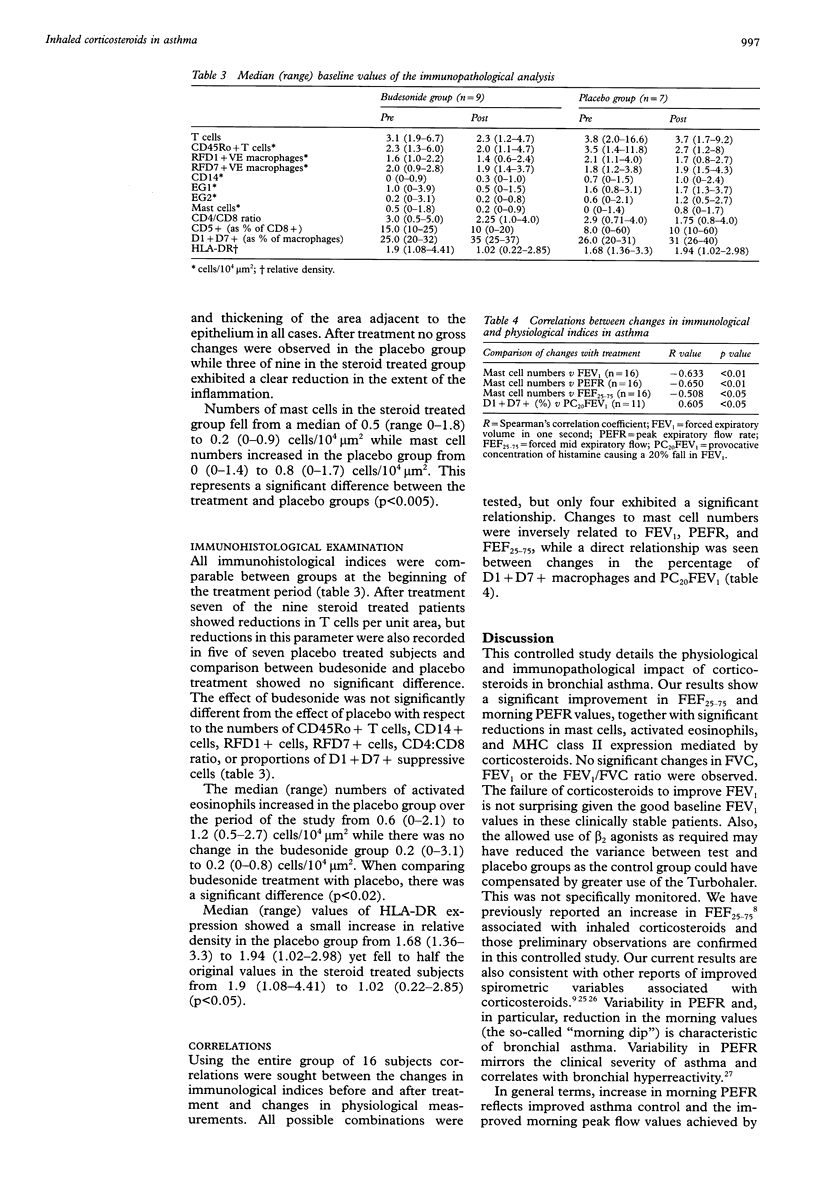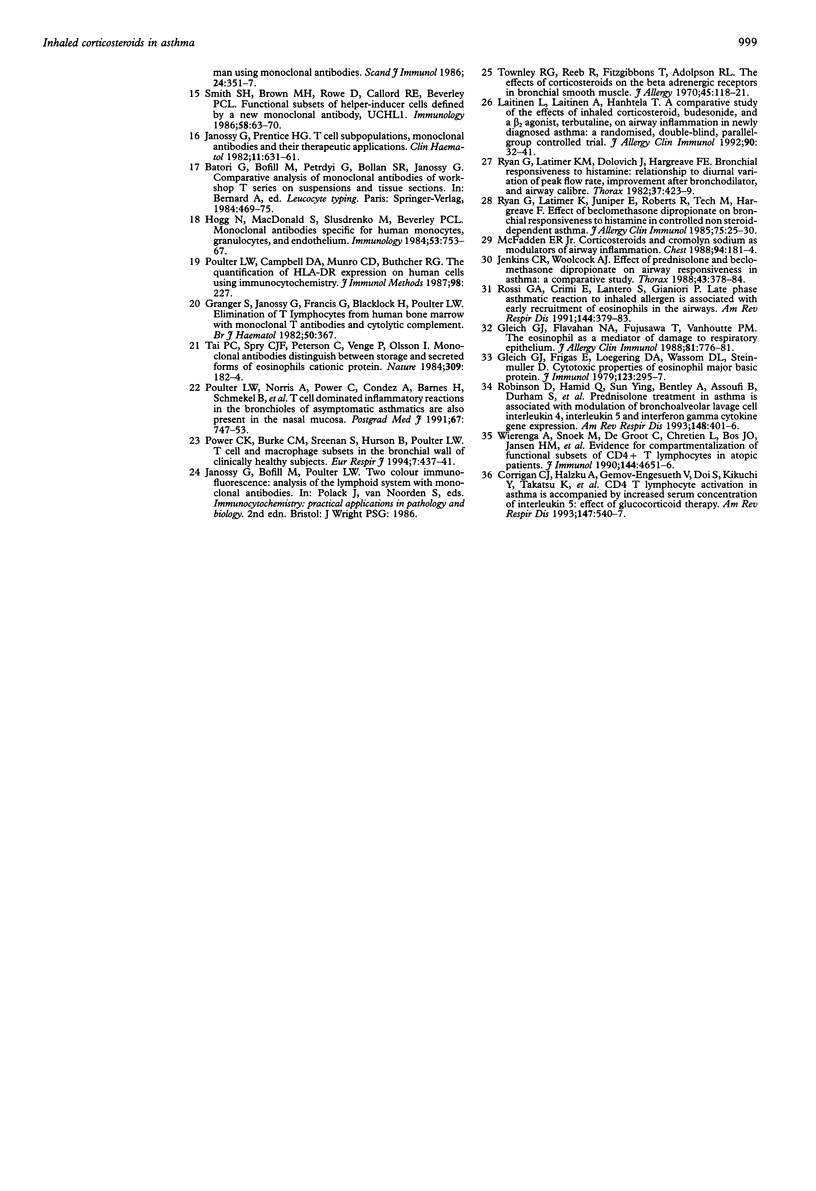Abstract
BACKGROUND: Although corticosteroids are recognised as the most efficacious treatment for bronchial asthma, their mode of action remains unclear. A placebo controlled trial was undertaken of the effect of inhaled corticosteroids on physiological and immmunopathological parameters in asthmatic patients in whom the correlations between these indices were tested after treatment. METHODS: Sixteen patients (two women) with asthma entered a double blind, placebo controlled, parallel study during which they inhaled either budesonide 800 micrograms twice daily or matching placebo for six weeks. Spirometric parameters and bronchial reactivity to histamine and terbutaline were measured and endobronchial biopsy samples were taken before and after treatment. Patients recorded morning and evening flow rates during the treatment period. The biopsy samples were subjected to immunohistological analysis to determine the disposition of inflammatory cells within the bronchial wall. RESULTS: Treatment with budesonide resulted in a significant improvement in the 25-75% forced expiratory flow (FEF25-75) from a mean of 133 l/min before treatment to 169 l/min after treatment, and in the morning peak expiratory flow rate (PEFR) from a mean of 384 l/min before treatment to 415 l/min after treatment. No changes were seen in the placebo group. Comparison between the changes in the immunopathological indices after six weeks of treatment with placebo or budesonide showed a significant reduction in the numbers of mast cells (0.5/unit area to 0.2/ unit area), activated eosinophils, and the expression of HLA-DR antigens (relative density -1.9 before to 1.02 after treatment) on inflammatory cells in response to treatment with budesonide. Although reductions in the numbers of other inflammatory cells within the bronchial wall were recorded using immunohistological analysis, these changes were not statistically significant. Significant correlations were found between changing immunological indices and lung physiology. CONCLUSIONS: This controlled study shows that inhaled corticosteroids cause improvement in physiological and immunopathological parameters in patients with stable asthma that are not seen with placebo, and that cause and effect relationships may exist between these two measures of disease status.
Full text
PDF






Selected References
These references are in PubMed. This may not be the complete list of references from this article.
- Beasley R., Roche W. R., Roberts J. A., Holgate S. T. Cellular events in the bronchi in mild asthma and after bronchial provocation. Am Rev Respir Dis. 1989 Mar;139(3):806–817. doi: 10.1164/ajrccm/139.3.806. [DOI] [PubMed] [Google Scholar]
- Bousquet J., Chanez P., Lacoste J. Y., Barnéon G., Ghavanian N., Enander I., Venge P., Ahlstedt S., Simony-Lafontaine J., Godard P. Eosinophilic inflammation in asthma. N Engl J Med. 1990 Oct 11;323(15):1033–1039. doi: 10.1056/NEJM199010113231505. [DOI] [PubMed] [Google Scholar]
- Burke C., Power C. K., Norris A., Condez A., Schmekel B., Poulter L. W. Lung function and immunopathological changes after inhaled corticosteroid therapy in asthma. Eur Respir J. 1992 Jan;5(1):73–79. [PubMed] [Google Scholar]
- Clarkson K., Power C. K., O'Connell F., Pathmakanthan S., Burke C. M. A comparative evaluation of propofol and midazolam as sedative agents in fiberoptic bronchoscopy. Chest. 1993 Oct;104(4):1029–1031. doi: 10.1378/chest.104.4.1029. [DOI] [PubMed] [Google Scholar]
- Corrigan C. J., Haczku A., Gemou-Engesaeth V., Doi S., Kikuchi Y., Takatsu K., Durham S. R., Kay A. B. CD4 T-lymphocyte activation in asthma is accompanied by increased serum concentrations of interleukin-5. Effect of glucocorticoid therapy. Am Rev Respir Dis. 1993 Mar;147(3):540–547. doi: 10.1164/ajrccm/147.3.540. [DOI] [PubMed] [Google Scholar]
- Djukanović R., Wilson J. W., Britten K. M., Wilson S. J., Walls A. F., Roche W. R., Howarth P. H., Holgate S. T. Effect of an inhaled corticosteroid on airway inflammation and symptoms in asthma. Am Rev Respir Dis. 1992 Mar;145(3):669–674. doi: 10.1164/ajrccm/145.3.669. [DOI] [PubMed] [Google Scholar]
- Durham S. R., Kay A. B. Eosinophils, bronchial hyperreactivity and late-phase asthmatic reactions. Clin Allergy. 1985 Sep;15(5):411–418. doi: 10.1111/j.1365-2222.1985.tb02290.x. [DOI] [PubMed] [Google Scholar]
- Gleich G. J., Flavahan N. A., Fujisawa T., Vanhoutte P. M. The eosinophil as a mediator of damage to respiratory epithelium: a model for bronchial hyperreactivity. J Allergy Clin Immunol. 1988 May;81(5 Pt 1):776–781. doi: 10.1016/0091-6749(88)90931-1. [DOI] [PubMed] [Google Scholar]
- Granger S., Janossy G., Francis G., Blacklock H., Poulter L. W., Hoffbrand A. V. Elimination of T-lymphocytes from human bone marrow with monoclonal T-antibodies and cytolytic complement. Br J Haematol. 1982 Feb;50(2):367–374. doi: 10.1111/j.1365-2141.1982.tb01928.x. [DOI] [PubMed] [Google Scholar]
- Hogg N., MacDonald S., Slusarenko M., Beverley P. C. Monoclonal antibodies specific for human monocytes, granulocytes and endothelium. Immunology. 1984 Dec;53(4):753–767. [PMC free article] [PubMed] [Google Scholar]
- Janossy G., Prentice H. G. T cell subpopulations, monoclonal antibodies and their therapeutic applications. Clin Haematol. 1982 Oct;11(3):631–660. [PubMed] [Google Scholar]
- Jeffery P. K., Godfrey R. W., Adelroth E., Nelson F., Rogers A., Johansson S. A. Effects of treatment on airway inflammation and thickening of basement membrane reticular collagen in asthma. A quantitative light and electron microscopic study. Am Rev Respir Dis. 1992 Apr;145(4 Pt 1):890–899. doi: 10.1164/ajrccm/145.4_Pt_1.890. [DOI] [PubMed] [Google Scholar]
- Jeffery P. K., Wardlaw A. J., Nelson F. C., Collins J. V., Kay A. B. Bronchial biopsies in asthma. An ultrastructural, quantitative study and correlation with hyperreactivity. Am Rev Respir Dis. 1989 Dec;140(6):1745–1753. doi: 10.1164/ajrccm/140.6.1745. [DOI] [PubMed] [Google Scholar]
- Jenkins C. R., Woolcock A. J. Effect of prednisone and beclomethasone dipropionate on airway responsiveness in asthma: a comparative study. Thorax. 1988 May;43(5):378–384. doi: 10.1136/thx.43.5.378. [DOI] [PMC free article] [PubMed] [Google Scholar]
- Laitinen L. A., Laitinen A., Haahtela T. A comparative study of the effects of an inhaled corticosteroid, budesonide, and a beta 2-agonist, terbutaline, on airway inflammation in newly diagnosed asthma: a randomized, double-blind, parallel-group controlled trial. J Allergy Clin Immunol. 1992 Jul;90(1):32–42. doi: 10.1016/s0091-6749(06)80008-4. [DOI] [PubMed] [Google Scholar]
- McFadden E. R., Jr Corticosteroids and cromolyn sodium as modulators of airway inflammation. Chest. 1988 Jul;94(1):181–184. doi: 10.1378/chest.94.1.181. [DOI] [PubMed] [Google Scholar]
- Poulter L. W., Campbell D. A., Munro C., Butcher R. G. The quantitation of HLA-DR expression on human cells using immunocytochemistry. J Immunol Methods. 1987 Apr 16;98(2):227–234. doi: 10.1016/0022-1759(87)90009-3. [DOI] [PubMed] [Google Scholar]
- Poulter L. W., Campbell D. A., Munro C., Janossy G. Discrimination of human macrophages and dendritic cells by means of monoclonal antibodies. Scand J Immunol. 1986 Sep;24(3):351–357. doi: 10.1111/j.1365-3083.1986.tb02104.x. [DOI] [PubMed] [Google Scholar]
- Poulter L. W., Norris A., Power C., Condez A., Burnes H., Schmekel B., Burke C. T cell dominated inflammatory reactions in the bronchioles of asymptomatic asthmatics are also present in the nasal mucosa. Postgrad Med J. 1991 Aug;67(790):747–753. doi: 10.1136/pgmj.67.790.747. [DOI] [PMC free article] [PubMed] [Google Scholar]
- Poulter L. W., Power C., Burke C. The relationship between bronchial immunopathology and hyperresponsiveness in asthma. Eur Respir J. 1990 Jul;3(7):792–799. [PubMed] [Google Scholar]
- Power C. K., Burke C. M., Sreenan S., Hurson B., Poulter L. W. T-cell and macrophage subsets in the bronchial wall of clinically healthy subjects. Eur Respir J. 1994 Mar;7(3):437–441. doi: 10.1183/09031936.94.07030437. [DOI] [PubMed] [Google Scholar]
- Robinson D., Hamid Q., Ying S., Bentley A., Assoufi B., Durham S., Kay A. B. Prednisolone treatment in asthma is associated with modulation of bronchoalveolar lavage cell interleukin-4, interleukin-5, and interferon-gamma cytokine gene expression. Am Rev Respir Dis. 1993 Aug;148(2):401–406. doi: 10.1164/ajrccm/148.2.401. [DOI] [PubMed] [Google Scholar]
- Roche W. R., Beasley R., Williams J. H., Holgate S. T. Subepithelial fibrosis in the bronchi of asthmatics. Lancet. 1989 Mar 11;1(8637):520–524. doi: 10.1016/s0140-6736(89)90067-6. [DOI] [PubMed] [Google Scholar]
- Rossi G. A., Crimi E., Lantero S., Gianiorio P., Oddera S., Crimi P., Brusasco V. Late-phase asthmatic reaction to inhaled allergen is associated with early recruitment of eosinophils in the airways. Am Rev Respir Dis. 1991 Aug;144(2):379–383. doi: 10.1164/ajrccm/144.2.379. [DOI] [PubMed] [Google Scholar]
- Ryan G., Latimer K. M., Dolovich J., Hargreave F. E. Bronchial responsiveness to histamine: relationship to diurnal variation of peak flow rate, improvement after bronchodilator, and airway calibre. Thorax. 1982 Jun;37(6):423–429. doi: 10.1136/thx.37.6.423. [DOI] [PMC free article] [PubMed] [Google Scholar]
- Ryan G., Latimer K. M., Juniper E. F., Roberts R. S., Hargreave F. E. Effect of beclomethasone dipropionate on bronchial responsiveness to histamine in controlled nonsteroid-dependent asthma. J Allergy Clin Immunol. 1985 Jan;75(1 Pt 1):25–30. doi: 10.1016/0091-6749(85)90007-7. [DOI] [PubMed] [Google Scholar]
- Smith S. H., Brown M. H., Rowe D., Callard R. E., Beverley P. C. Functional subsets of human helper-inducer cells defined by a new monoclonal antibody, UCHL1. Immunology. 1986 May;58(1):63–70. [PMC free article] [PubMed] [Google Scholar]
- Tai P. C., Spry C. J., Peterson C., Venge P., Olsson I. Monoclonal antibodies distinguish between storage and secreted forms of eosinophil cationic protein. Nature. 1984 May 10;309(5964):182–184. doi: 10.1038/309182a0. [DOI] [PubMed] [Google Scholar]
- Wardlaw A. J., Dunnette S., Gleich G. J., Collins J. V., Kay A. B. Eosinophils and mast cells in bronchoalveolar lavage in subjects with mild asthma. Relationship to bronchial hyperreactivity. Am Rev Respir Dis. 1988 Jan;137(1):62–69. doi: 10.1164/ajrccm/137.1.62. [DOI] [PubMed] [Google Scholar]
- Wierenga E. A., Snoek M., de Groot C., Chrétien I., Bos J. D., Jansen H. M., Kapsenberg M. L. Evidence for compartmentalization of functional subsets of CD2+ T lymphocytes in atopic patients. J Immunol. 1990 Jun 15;144(12):4651–4656. [PubMed] [Google Scholar]


